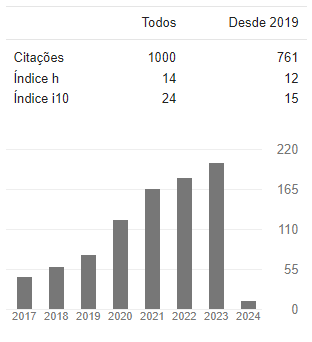¿Cómo un profesor de Matemáticas percibe e interpreta respuestas matemáticas de sus estudiantes en clase?
DOI:
10.37084/REMATEC.1980-3141.2021.n38.p86-101.id338Palavras-chave:
mirada profesional, conocimiento matemático específico de la docencia, profesor de MatemáticasResumo
El trabajo del profesor de Matemáticas es dinámico, multifacético y, muchas veces, imprevisible. Su planeamiento y el propio desarrollo de las clases son, en general, fuertemente influenciados por la forma como percibe e interpreta lo que observa en la clase. En ese estudio de naturaleza cualitativa, se investiga cómo un profesor español de Matemáticas experimentado percibe e interpreta registros y respuestas de sus estudiantes. Para esto, fueron acompañadas diez clases de este profesor y se realizó una entrevista con él. Los resultados sugieren que se trata de un profesor bastante involucrado en su oficio y atento a sus estudiantes, que posee y se orienta, en buena medida, por los saberes experienciales que desarrolló a lo largo de su vida profesional. Aun así, probablemente debido a la ausencia de oportunidades de desarrollo de conocimientos matemáticos específicos de la docencia, no ha construido totalmente una mirada profesional hacia el pensamiento matemático de sus estudiantes.
Downloads
Métricas
Referências
BALDINGER, E. M. “Maybe It’s a Status Problem” Development of Mathematics Teacher Noticing for Equity. In: SCHACK, E. O. et al. (eds.) Teacher Noticing: Bridging and Broadening Perspectives, Contexts, and Frameworks, Research in Mathematics Education, p.231-250, 2017 DOI: https://doi.org/10.1007/978-3-319-46753-5_14
BALL, D. L.; THAMES, M. H.; PHELPS, G. Content knowledge for teaching: What makes it special? Journal of Teacher Education, v. 59, n. 5, p.389–407, 2008 DOI: https://doi.org/10.1177/0022487108324554
GATTI, B. A.; SÁ-BARRETTO, E. S. de. Professores do Brasil: impasses e desafios. Brasília: UNESCO, 2009
INSTITUTO DE EVALUACIÓN (2013). TALIS (OCDE) Estudio Internacional sobre la Enseñanza y Aprendizaje, Informe Español, 2013. Madrid: Ministerio de Educación, disponible en http://www.educacionyfp.gob.es/inee/dam/jcr:530e4938-f6c5-446c-937c-4c9df0a37481/talispublicacionessep2014.pdf).
JACOBS, V. R.; LAMB, L. L. C.; PHILIPP, R. A. Professional noticing of children’s mathematical thinking. Journal for Research in Mathematics Education, v. 41, n. 2, p.169–202, 2010 DOI: https://doi.org/10.5951/jresematheduc.41.2.0169
JACOBS, V. R.; LAMB, L. L. C.; PHILIPP, R. A.; SCHAPPELLE, B.; BURKE, A. Professional Noticing by Elementary School Teachers of Mathematics. Proceedings of Research Association Annual Meeting, April 2007, Chicago, IL. Disponible en https://pdfs.semanticscholar.org/a380/5b0b2150783f1b13be2ce5153228e5f007eb.pdf
LLINARES, S. Professional noticing: A component of the mathematics teacher's professional practice. SISYPHUS Journal of Education, v. 1, n. 3, p.76–93, 2013
MASON, J. Researching your own practice: The discipline of noticing. UK: Routledge, 2002 DOI: https://doi.org/10.4324/9780203471876
MELHUISH, K.; THANHEISER, E.; FASTEEN, J. y FREDERICKS, J. Teacher Noticing of justification: attending to the complexity of mathematical content and practice. In: BARTELL, T. G.; BIEDA, K. N.; PUTNAM, R. T.; BRADFIELD, K. E DOMINGUEZ, H. (Eds.). Proceedings of the 37th annual meeting of the North American Chapter of the International Group for the Psychology of Mathematics Education. East Lansing, MI: Michigan State University, p. 748-754, 2015
PATRONO, R. M.; FERREIRA, A. C. Levantamento de pesquisas brasileiras sobre o Conhecimento Matemático para o Ensino e Formação de Professores. REVEMOP, v. 3, p. e202102, p.1-24, 2021. https://doi.org/10.33532/revemop.e202102 DOI: https://doi.org/10.33532/revemop.e202102
PUENTES, R.V.; BOTIA, A. B. y VERDEJO, A. M. Una valoración de la formación inicial de profesores en España: el Máster en Educación Secundaria. Educação em Revista, Belo Horizonte, v. 31, n. 03, p.251-278, Julho-Setembro, 2015. https://doi.org/10.1590/0102-4698132995 DOI: https://doi.org/10.1590/0102-4698132995
RHODES, Ginger. Professional Noticing: how do teachers make sense of students’ mathematical thinking? (Tesis de doctorado). University of Georgia, 2007
SCHACK, E. O.; FISHER, M. H. E WILHELM, J. A. (eds.) Teacher Noticing: Bridging and Broadening Perspectives, Contexts, and Frameworks, Research in Mathematics Education, Londres: Springer International Publishing, 2017. DOI: https://doi.org/10.1007/978-3-319-46753-5
SCHOENFELD, A. Book Review: Mason, John. Researching your own practice: The discipline of noticing. Journal of Mathematics Teacher Education, v. 6, p.77-91, 2002, https://doi.org/10.1023/A:1022107814447 DOI: https://doi.org/10.1023/A:1022107814447
WICKSTROM, M. Do you notice what I notice? productive mediums for teacher noticing. In: BARTELL, T. G., BIEDA, K. N., PUTNAM, R. T., BRADFIELD, K. e DOMINGUEZ, H. (Eds.). Proceedings of the 37th annual meeting of the North American Chapter of the International Group for the Psychology of Mathematics Education. East Lansing, MI: Michigan State University, p. 1094-1101, 2015
WICKSTROM, M. H., BAEK, J., BARRETT, J. E., CULLEN, C. J., e TOBIAS, J. M. (). Teacher noticing of children’s understanding of linear measurement. Proceedings of the 34rd Annual Meeting of the North American Chapter of the International Group for the Psychology of Mathematics Education. Kalamazoo, MI: Western Michigan University.
Downloads
Publicado
- Visualizações do Artigo 135
- PDF downloads: 40






































































